人教版八年级英语下册 单元基础知识过关一
- 格式:docx
- 大小:41.87 KB
- 文档页数:6
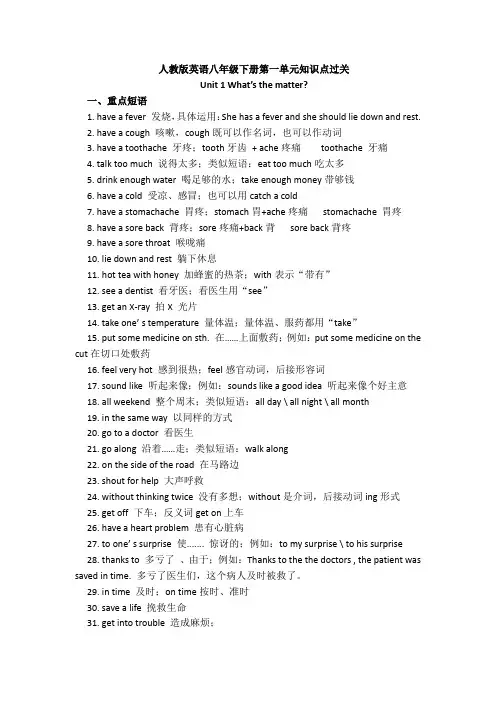
人教版英语八年级下册第一单元知识点过关Unit 1 What’s the matter?一、重点短语1. have a fever 发烧,具体运用:She has a fever and she should lie down and rest.2. have a cough 咳嗽,cough既可以作名词,也可以作动词3. have a toothache 牙疼;tooth牙齿+ ache疼痛toothache 牙痛4. talk too much 说得太多;类似短语:eat too much吃太多5. drink enough water 喝足够的水;take enough money带够钱6. have a cold 受凉、感冒;也可以用catch a cold7. have a stomachache 胃疼;stomach胃+ache疼痛stomachache 胃疼8. have a sore back 背疼;sore疼痛+back背sore back背疼9. have a sore throat 喉咙痛10. lie down and rest 躺下休息11. hot tea with honey 加蜂蜜的热茶;with表示“带有”12. see a dentist 看牙医;看医生用“see”13. get an X-ray 拍X 光片14. take one’ s temperature 量体温;量体温、服药都用“take”15. put some medicine on sth. 在……上面敷药;例如:put some medicine on the cut在切口处敷药16. feel very hot 感到很热;feel感官动词,后接形容词17. sound like 听起来像;例如:sounds like a good idea 听起来像个好主意18. all weekend 整个周末;类似短语:all day \ all night \ all month19. in the same way 以同样的方式20. go to a doctor 看医生21. go along 沿着……走;类似短语:walk along22. on the side of the road 在马路边23. shout for help 大声呼救24. without thinking twice 没有多想;without是介词,后接动词ing形式25. get off 下车;反义词get on上车26. have a heart problem 患有心脏病27. to one’ s surprise 使....... 惊讶的;例如:to my surprise \ to his surprise28. thanks to 多亏了、由于;例如:Thanks to the the doctors , the patient was saved in time. 多亏了医生们,这个病人及时被救了。
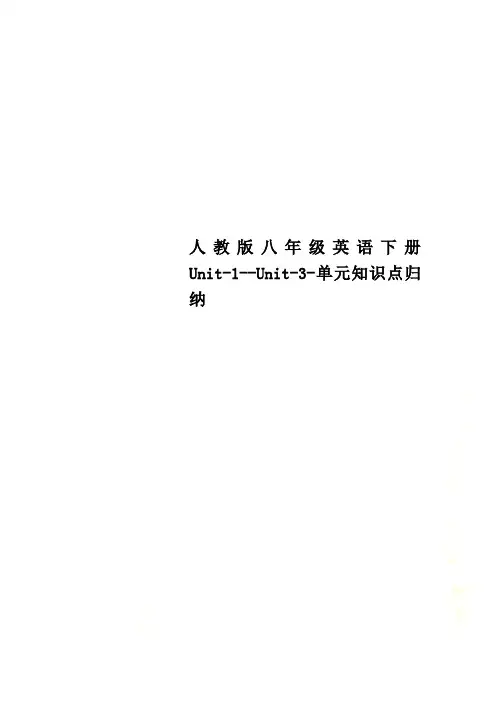
人教版八年级英语下册Unit-1--Unit-3-单元知识点归纳free【动词】使……解脱,得到自由He could not free his arm.free from21. run out用完,用尽 When his water run out, he knew that he would have to do something to save his own life.物sth. tun out. 某物用尽了。
人sb. run out of物sth..人用尽了某物。
He run out of all his money last night.22.risk sth to do sth. 冒着...的风险去做某事 take a risk=take risks 冒险risk doing ...=take the risk of doing ...23. the importance of (doing) sth.(做)某事的重要性 We students should know the importance of (learning) English.importance n. 重要(性), important adj.重要的,unimportant adj.24.decision 【名词】决定;抉择; make a decision to do sth.decide25. be in the control of …掌管,管理 The headmaster is in the control of this new school. be out of control无法控制,无法管理 be under control被控制住,在控制之中26. 【复习】mind意为介意,Would you mind my opening the window?27. give up (doing) sth. 放弃(做)某事,give up (playing) computer games;give up后可接名词、代词和动词ing形式,也可不接,如 Never give up easily.II. 重点短语1. have a fever 发烧2. have a cough 咳嗽3. have a toothache 牙疼4. talk too much 说得太多5. drink enough water 喝足够的水6. have a cold 受凉;感冒7. have a stomachache 胃疼8. have a sore back 背疼9. have a sore throat 喉咙痛10. lie down and rest 躺下来休息11. hot tea w ith honey 加蜂蜜的热茶12. see a dentist 看牙医13. get an X-ray 拍X 光片14. take one’ s temperature量体温15. put some medicine on sth. 在……上面敷药16. feel very hot 感到很热17. sound like 听起来像18. all weekend 整个周末19. in the same way 以同样的方式20. go to a doctor 看医生21. go along 沿着……走22. on the side of the road 在马路边23. shout for help 大声呼救24. without thinking twice 没有多想25. get off 下车26. have a heart problem 有心脏病27. to one’ s surprise使....... 惊讶的28. thanks to 多亏了;由于29. in time 及时30. save a/one’s life挽救生命lose one's life 31. get into trouble 造成麻烦32. right away 立刻;马上33. because of 由于34. get out of 离开;从……出萍35. hurt oneself 受伤36. put a bandage on sth. 用绷带包扎37. fa ll down 摔倒38. feel sick 感到恶心39. have a nosebleed 流鼻血40. cut his knee 割伤他的膝盖41. put her head back 把她的头向后仰42. have problems breathing 呼吸困难43. mountain climbing 登山运动44. be used to doing sth. 习惯做某事45. run out (of) 用完;用尽46. so that 以便47. so. . . that 如此… …以至于…48. be in control of 掌管;管理49. in a difficult situation 在闲境屮50. keep on doing sth. 继续或坚持做某事51. make a decision 做出决定52. take risks 冒险53. give up 放弃III. 重点语法【反身代词】英语中共有八个反身代词,在使用时应注意和它所指的相应的对象在人称、性别、数上保持一致。
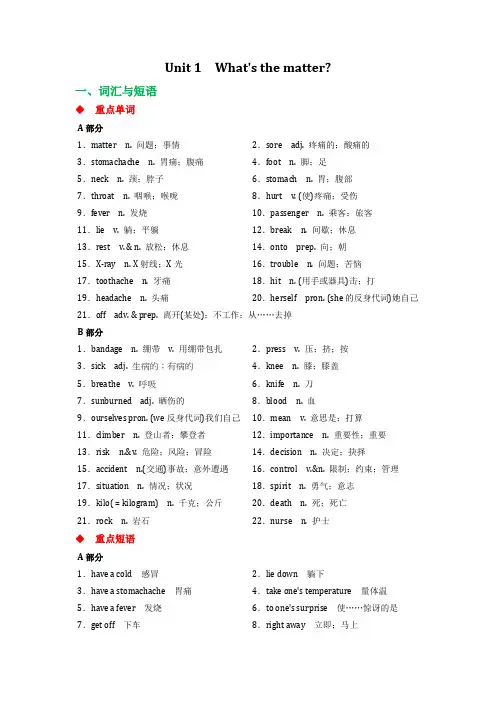
Unit 1 What's the matter?一、词汇与短语◆重点单词A部分1.matter n. 问题;事情2.sore adj. 疼痛的;酸痛的3.stomachache n. 胃痛;腹痛4.foot n. 脚;足5.neck n. 颈;脖子6.stomach n. 胃;腹部7.throat n. 咽喉;喉咙8.hurt v. (使)疼痛;受伤9.fever n. 发烧10.passenger n. 乘客;旅客11.lie v. 躺;平躺12.break n. 间歇;休息13.rest v. &n. 放松;休息14.onto prep. 向;朝15.X-ray n. X射线;X光16.trouble n. 问题;苦恼17.toothache n. 牙痛18.hit n. (用手或器具)击;打19.headache n. 头痛20.herself pron. (she的反身代词)她自己21.off adv. & prep. 离开(某处);不工作;从……去掉B部分1.bandage n. 绷带v. 用绷带包扎2.press v. 压;挤;按3.sick adj. 生病的;有病的4.knee n. 膝;膝盖5.breathe v. 呼吸6.knife n. 刀7.sunburned adj. 晒伤的8.blood n. 血9.ourselves pron. (we反身代词)我们自己10.mean v. 意思是;打算11.climber n. 登山者;攀登者12.importance n. 重要性;重要13.risk n.&v. 危险;风险;冒险14.decision n. 决定;抉择15.accident n.(交通)事故;意外遭遇16.control v.&n. 限制;约束;管理17.situation n. 情况;状况18.spirit n. 勇气;意志19.kilo( = kilogram) n. 千克;公斤20.death n. 死;死亡21.rock n. 岩石22.nurse n. 护士◆重点短语A部分1.have a cold 感冒2.lie down 躺下3.have a stomachache 胃痛4.take one's temperature 量体温5.have a fever 发烧6.to one's surprise 使……惊讶的是7.get off 下车8.right away 立即;马上9.take breaks (take a break) 休息10.talk too much 说得太多11.drink enough water 喝足够的水12.have a very sore throat 嗓子非常疼13.get an X-ray 拍X光片14.see a dentist 看牙医15.drink some hot tea with honey 喝一些加蜂蜜的热茶16.put some medicine on sth.在……上面敷一些药17.feel very hot 感到很热18.sound like 听起来像19.all weekend 整个周末20.in the same way 以同样的方式21.go to a doctor 看医生22.go along 沿着……走23.on the side of the road 在马路边24.shout for help 大声呼救25.without thinking twice 没有多想26.have a heart problem 有心脏病27.thanks to 多亏了;由于28.in time 及时29.save a life 挽救生命30.get into trouble 陷入麻烦31.hurt oneself 受伤32.fall down落下;摔倒B部分1.be used to 习惯于……;适应于……2.in a difficult situation 在困境中3.take risks (take a risk) 冒险4.keep on doing sth. 继续(或坚持)做某事5.run out (of) 用尽;耗尽6.make a decision 作出决定7.cut off 切除8.get hit on the head 撞到头部9.get out of 离开;从……岀来10.be interested in 对……感兴趣11.give up 放弃12.mean doing sth. 意味着做某事13.put a bandage on sth. 用绷带包扎…14.lose one's life 失去生命15.feel sick 感到恶心16.mountain climbing 登山运动17.have problems breathing 呼吸困难18.be in control of 掌管;管理◆重点句子A部分1.What's the matter with you?=What's the trouble with you?=What's wrong with you?你怎么了?2.What should she do? 她该怎么办呢?3.Did you fall down? 你跌倒了吗?4.Should I take my temperature? 我应该量一下体温吗?5.I think I sat in the same way for too long without moving.我想我以同样的姿势一动不动地坐得太久了。
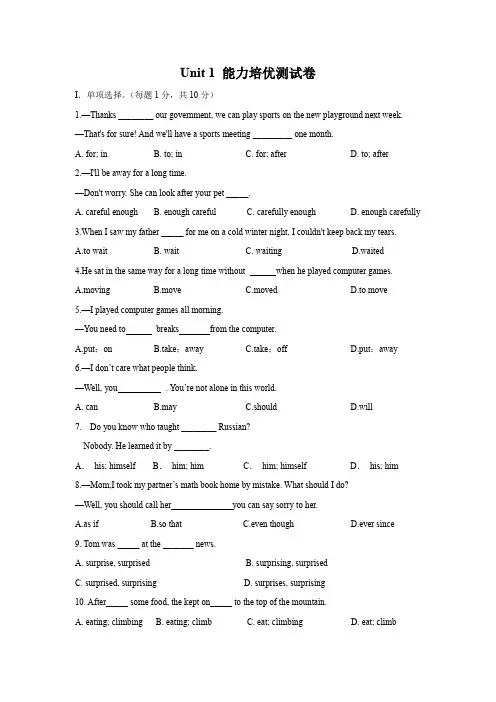
Unit 1 能力培优测试卷I.单项选择。
(每题1分,共10分)1.—Thanks ________ our government, we can play sports on the new playground next week.—That's for sure! And we'll have a sports meeting _________ one month.A. for; inB. to; inC. for; afterD. to; after2.—I'll be away for a long time.—Don't worry. She can look after your pet _____.A. careful enoughB. enough carefulC. carefully enoughD. enough carefully3.When I saw my father _____ for me on a cold winter night, I couldn't keep back my tears.A.to waitB. waitC. waitingD.waited4.He sat in the same way for a long time without when he played computer games.A.movingB.moveC.movedD.to move5.—I played computer games all morning.—You need to breaks from the computer.A.put;onB.take;awayC.take;offD.put;away6.—I don’t care what people think.—Well, you . You’re not alone in this world.A. canB.mayC.shouldD.will7.---Do you know who taught ________ Russian?---Nobody. He learned it by ________.A.his; himself B.him; him C.him; himself D.his; him 8.—Mom,I took my partner’s math book home by mistake. What should I do?—Well, you should call her you can say sorry to her.A.as ifB.so thatC.even thoughD.ever since9. Tom was _____ at the _______ news.A. surprise, surprisedB. surprising, surprisedC. surprised, surprisingD. surprises, surprising10. After_____ some food, the kept on_____ to the top of the mountain.A. eating; climbingB. eating; climbC. eat; climbingD. eat; climbII. 完形填空。
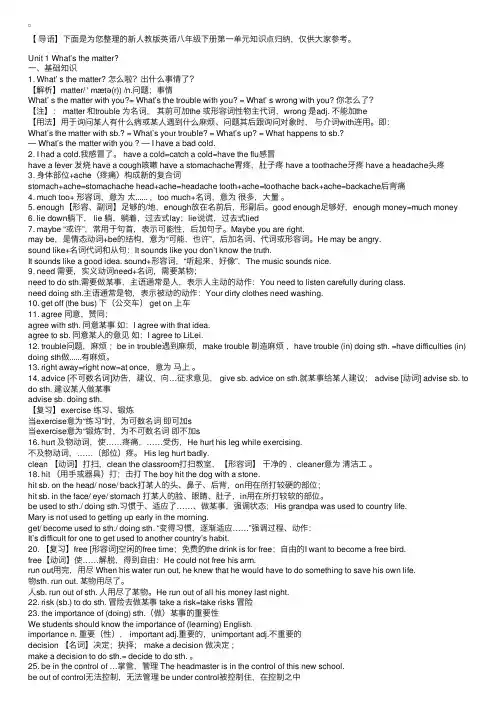
【导语】下⾯是为您整理的新⼈教版英语⼋年级下册第⼀单元知识点归纳,仅供⼤家参考。
Unit 1 What’s the matter?⼀、基础知识1. What’ s the matter? 怎么啦?出什么事情了?【解析】matter/ ' mætə(r)) /n.问题;事情What’ s the matter with you?= What’s the trouble with you? = What’ s wrong with you? 你怎么了?【注】: matter 和trouble 为名词,其前可加the 或形容词性物主代词,wrong 是adj. 不能加the【⽤法】⽤于询问某⼈有什么病或某⼈遇到什么⿇烦、问题其后跟询问对象时,与介词with连⽤。
即:What’s the matter with sb.? = What’s your trouble? = What’s up? = What happens to sb.?— What’s the matter with you ? — I have a bad cold.2. I had a cold.我感冒了。
have a cold=catch a cold=have the flu感冒have a fever 发烧 have a cough咳嗽 have a stomachache胃疼,肚⼦疼 have a toothache⽛疼 have a headache头疼3. ⾝体部位+ache(疼痛)构成新的复合词stomach+ache=stomachache head+ache=headache tooth+ache=toothache back+ache=backache后背痛4. much too+ 形容词,意为太...... ,too much+名词,意为很多,⼤量。
5. enough【形容、副词】⾜够的/地,enough放在名前后,形副后。
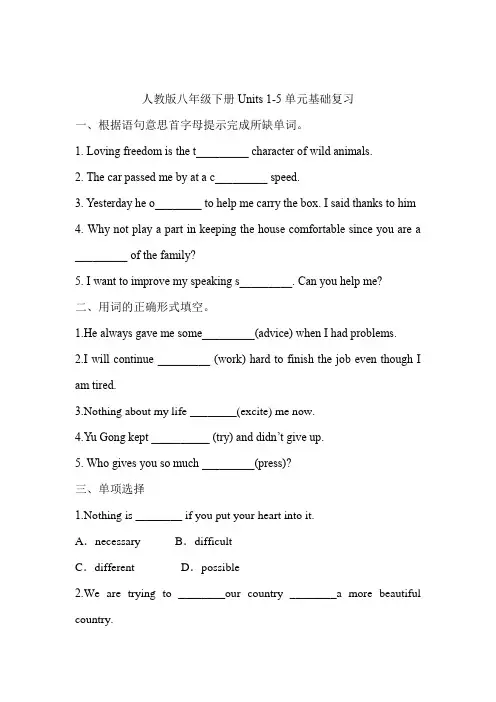
人教版八年级下册Units 1-5单元基础复习一、根据语句意思首字母提示完成所缺单词。
1. Loving freedom is the t_________ character of wild animals.2. The car passed me by at a c_________ speed.3. Yesterday he o________ to help me carry the box. I said thanks to him4. Why not play a part in keeping the house comfortable since you are a _________ of the family?5. I want to improve my speaking s_________. Can you help me?二、用词的正确形式填空。
1.He always gave me some_________(advice) when I had problems.2.I will continue _________ (work) hard to finish the job even though I am tired.3.Nothing about my life ________(excite) me now.4.Yu Gong kept __________ (try) and didn’t give up.5. Who gives you so much _________(press)?三、单项选择1.Nothing is ________ if you put your heart into it.A.necessary B.difficultC.different D.possible2.We are trying to ________our country ________a more beautiful country.A. compare, withB. compare, toC. turn, intoD. look, after3.— I think Three Little Pigs is a great book. It shows us three lovely and smart characters.— ____.I read the book when I was five. But I still love it.A.I think it is a good idea B.I agree with youC.That's very kind of you D.I don't think it is beautiful enough4. Paul never plays computer games. He thinks it is a of time.A. keyB. questionC. symbolD. waste5. — Which of the two hats do you want, sir?---. One is too big and the other is too small.A. EitherB. BothC. NeitherD. None6. I don't want to buy this dress. It's too expensive, and I don't like its color.A. anywayB. elseC. probablyD. almost7. In order healthy, I run every morning and go swimming every Friday.A. keepB. keptC. keepingD. to keep8.There is a ruler on the ground. Please ______ .A.pick up B.pick it up C.pick up them D.pick them9.Can you tell me what happened ________ him just now?A.with B.for C.to D.at 10. –I’m going to add some tomato sauce to the salad, if you don’t________.--Not at all. Go ahead.A. careB. agreeC. mindD. insist四、完形填空Instead of taking a trip to a big city,my husband and I decided to take our children to go __1__.We drove to a campground(露营场地) in the afternoon. Everything went well till we tried to _2__ the new tent. We did it for the first time,__3__ the hot sun made the work harder. __4_,once we put it up,it looked nice. Then we went fishing,picked dry wood,made campfire and cooked dinner. They were __5_.All were peaceful and calm until _6__.We were sleeping when one of my _7_ woke me up and told me that she had a stomachache. Unluckily,we didn't bring any 8_ with us. Then it started to rain. And the rain leaked(泄露) in the tent! Everyone's sleeping bag went _9__.We couldn't __10__ the rest of the night. Early the next morning we packed up and went home.We will try again next time. Wish us luck and no rain!1. A. fishing B.swimming C.shopping D.camping2. A. give up B.put up C.get upD.turn up3. A. though B.and C.because D.if4. A. Therefore B.Or C.However D.Since5. A. important B.sad C.boring D.fun6. A. midnight B.afternoon C.noon D.morning7. A. children B.friends C.students D.neighbors8. A. snacks B.medicine C.salt D.clothes9. A. hot B.light C.wet D.dark10. A. play B.cook C.cry D.sleep。
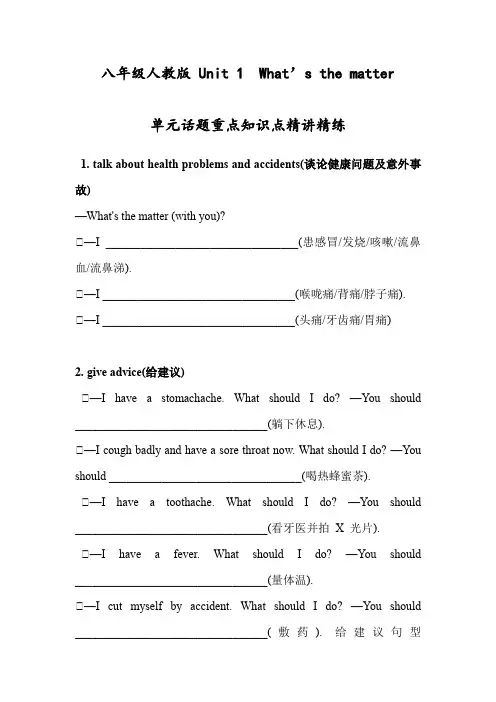
八年级人教版 Unit 1 What’s the matter单元话题重点知识点精讲精练1. talk about health problems and accidents(谈论健康问题及意外事故)—What's the matter (with you)?①—I _________________________________(患感冒/发烧/咳嗽/流鼻血/流鼻涕).①—I _________________________________(喉咙痛/背痛/脖子痛). ①—I _________________________________(头痛/牙齿痛/胃痛)2.give advice(给建议)①—I have a stomachache. What should I do? —You should _________________________________(躺下休息).①—I cough badly and have a sore throat now. What should I do? —You should _________________________________(喝热蜂蜜茶).①—I have a toothache. What should I do? —You should _________________________________(看牙医并拍X 光片).①—I have a fever. What should I do? —You should _________________________________(量体温).①—I cut myself by accident. What should I do? —You should _________________________________(敷药). 给建议句型___________________________________________________________ _______________________________________重点知识点:①matter n.问题;事情What's the matter ___________ you?(matter 可换成___________)What's ___________ with you? What happened ___________ you?matter v.要紧;有重大影响;事关紧要It doesn't matter.没关系The only thing that really matters is what the wall looks like when we are done and how much fun we have painting it.唯一重要的事情是当我们结束时墙的样子以及我们在刷墙过程中得到多少快乐。
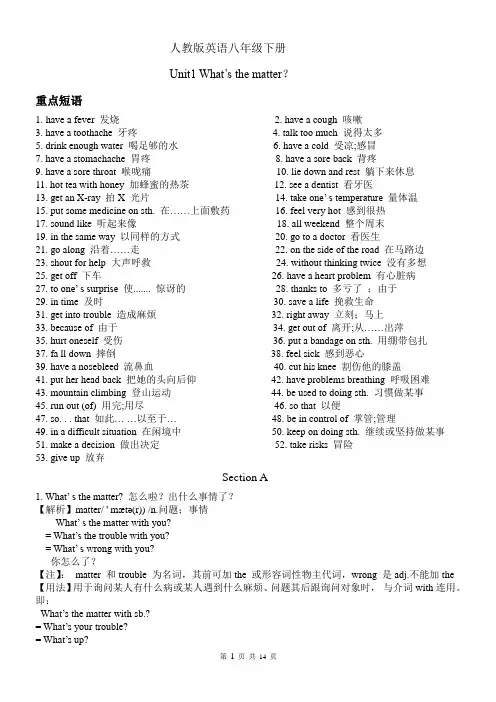
人教版英语八年级下册Unit1 What’s the matter?重点短语1.have a fever 发烧2. have a cough 咳嗽3. have a toothache 牙疼4. talk too much 说得太多5. drink enough water 喝足够的水6. have a cold 受凉;感冒7. have a stomachache 胃疼8. have a sore back 背疼9. have a sore throat 喉咙痛10. lie down and rest 躺下来休息11. hot tea with honey 加蜂蜜的热茶12. see a dentist 看牙医13. get an X-ray 拍X 光片14. take one’ s temperature 量体温15. put some medicine on sth. 在……上面敷药16. feel very hot 感到很热17. sound like 听起来像18. all weekend 整个周末19. in the same way 以同样的方式20. go to a doctor 看医生21. go along 沿着……走22. on the side of the road 在马路边23. shout for help 大声呼救24. without thinking twice 没有多想25. get off 下车26. have a heart problem 有心脏病27. to one’ s surprise 使....... 惊讶的28. thanks to 多亏了;由于29. in time 及时30. save a life 挽救生命31. get into trouble 造成麻烦32. right away 立刻;马上33. because of 由于34. get out of 离开;从……出萍35. hurt oneself 受伤36. put a bandage on sth. 用绷带包扎37. fa ll down 摔倒38. feel sick 感到恶心39. have a nosebleed 流鼻血40. cut his knee 割伤他的膝盖41. put her head back 把她的头向后仰42. have problems breathing 呼吸困难43. mountain climbing 登山运动44. be used to doing sth. 习惯做某事45. run out (of) 用完;用尽46. so that 以便47. so. . . that 如此… …以至于…48. be in control of 掌管;管理49. in a difficult situation 在闲境中50. keep on doing sth. 继续或坚持做某事51. make a decision 做出决定52. take risks 冒险53. give up 放弃Section A1. What’ s the matter? 怎么啦?出什么事情了?【解析】matter/ ' mætə(r)) /n.问题;事情What’ s the matter with you?= What’s the trouble with you?= What’ s wrong with you?你怎么了?【注】:matter 和trouble 为名词,其前可加the 或形容词性物主代词,wrong 是adj.不能加the 【用法】用于询问某人有什么病或某人遇到什么麻烦、问题其后跟询问对象时,与介词with连用。
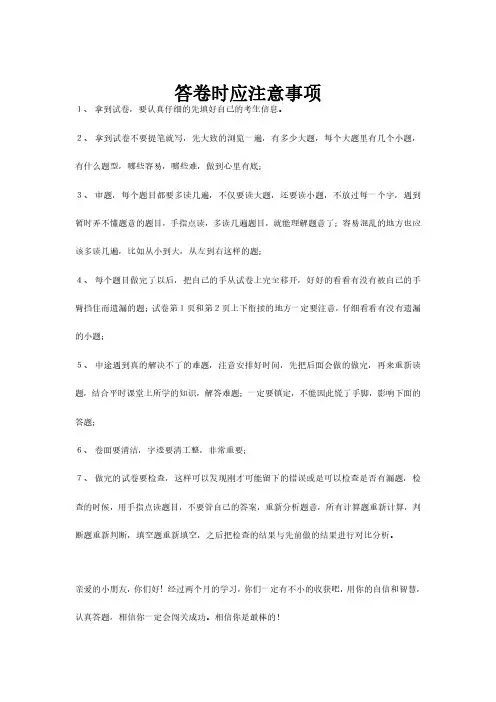
答卷时应注意事项1、拿到试卷,要认真仔细的先填好自己的考生信息。
2、拿到试卷不要提笔就写,先大致的浏览一遍,有多少大题,每个大题里有几个小题,有什么题型,哪些容易,哪些难,做到心里有底;3、审题,每个题目都要多读几遍,不仅要读大题,还要读小题,不放过每一个字,遇到暂时弄不懂题意的题目,手指点读,多读几遍题目,就能理解题意了;容易混乱的地方也应该多读几遍,比如从小到大,从左到右这样的题;4、每个题目做完了以后,把自己的手从试卷上完全移开,好好的看看有没有被自己的手臂挡住而遗漏的题;试卷第1页和第2页上下衔接的地方一定要注意,仔细看看有没有遗漏的小题;5、中途遇到真的解决不了的难题,注意安排好时间,先把后面会做的做完,再来重新读题,结合平时课堂上所学的知识,解答难题;一定要镇定,不能因此慌了手脚,影响下面的答题;6、卷面要清洁,字迹要清工整,非常重要;7、做完的试卷要检查,这样可以发现刚才可能留下的错误或是可以检查是否有漏题,检查的时候,用手指点读题目,不要管自己的答案,重新分析题意,所有计算题重新计算,判断题重新判断,填空题重新填空,之后把检查的结果与先前做的结果进行对比分析。
亲爱的小朋友,你们好!经过两个月的学习,你们一定有不小的收获吧,用你的自信和智慧,认真答题,相信你一定会闯关成功。
相信你是最棒的!Unit 1 单元基础练习与测试Ⅰ.根据句意及汉语提示完成句子(每小题1分,共计15分)1.He has a very bad ________(胃痛) from eating too much.2.There are three ________ (刀) on the table.3.She had a bad cold. She ________(咳嗽) day and night.4.This ________(意味着) we have lost the football match.5. As the saying goes, “God helps those who help(他们自己).”6.You need to learn to _____(控制) your feelings.7.My mother is outgoing. She likes talking in many _____ (情况).8.There is a big_____(岩石) on the way to the park.9.Nobody wants to get i________ trouble.10.There are too many p________ on the bus and it's crowded. 11.Please think t________ before you call him back.12.The old man didn't a________ to go to the hospital.13.Be careful, or the car may h________ you.14.Jane made a ________(决定) to have a trip this weekend.15.They have no ________(勇气;意志) for the dangerous journey.II.根据汉语意思完成句子,每空一词(每小题1分,共计10分)16.她昨天说话太多了,现在嗓子疼。
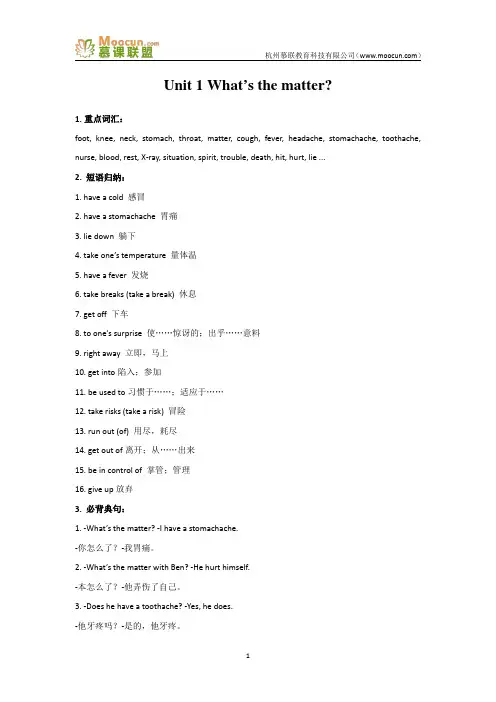
Unit 1 What’s the matter?1.重点词汇:foot, knee, neck, stomach, throat, matter, cough, fever, headache, stomachache, toothache, nurse, blood, rest, X-ray, situation, spirit, trouble, death, hit, hurt, lie ...2. 短语归纳:1. have a cold 感冒2. have a stomachache 胃痛3. lie down 躺下4. take one’s temperature 量体温5. have a fever 发烧6. take breaks (take a break) 休息7. get off 下车8. to one’s surprise 使……惊讶的;出乎……意料9. right away 立即,马上10. get into陷入;参加11. be used to习惯于……;适应于……12. take risks (take a risk) 冒险13. run out (of) 用尽,耗尽14. get out of离开;从……出来15. be in control of 掌管;管理16. give up放弃3. 必背典句:1. -What’s the matter? -I have a stomachache.-你怎么了?-我胃痛。
2. -What’s the matter with Ben? -He hurt himself.-本怎么了?-他弄伤了自己。
3. -Does he have a toothache? -Yes, he does.-他牙疼吗?-是的,他牙疼。
4. -What should she do? -She should take her temperature.-她应该做什么?-她应该量体温。
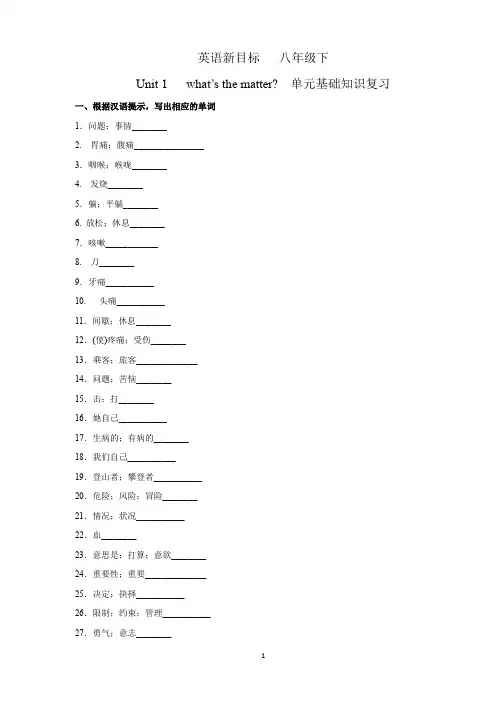
英语新目标八年级下Unit 1 what’s the matter? 单元基础知识复习一、根据汉语提示,写出相应的单词1.问题;事情________2. 胃痛;腹痛________________3.咽喉;喉咙________4. 发烧________5.躺;平躺________6. 放松;休息________7.咳嗽____________8. 刀________9.牙痛___________10. 头痛___________11.间歇;休息________12.(使)疼痛;受伤________13.乘客;旅客______________14.问题;苦恼________15.击;打________16.她自己___________17.生病的;有病的________18.我们自己___________19.登山者;攀登者___________20.危险;风险;冒险________21.情况;状况___________22.血________23.意思是;打算;意欲________24.重要性;重要______________25.决定;抉择___________26.限制;约束;管理___________27.勇气;意志________28.死;死亡________二、单元语法情态动词shouldshould属情态动词, 后接动词原形, 没有人称和数的变化。
用于提出建议劝告别人。
should的否定形式为should not, 通常缩写为shouldn’t。
1. — Tom, I have a toothache. 汤姆, 我牙痛。
— You should see a dentist. 你应当去看牙医。
2. — I’m not feeling well these days. I have bad cough. 这些天我身体不适, 老是咳嗽。
— You shouldn’t smoke so much, I think. 我认为你不该抽这么多烟。
第一单元语法复习1. 情态动词should的用法(1)情态动词should意为“应该”,后跟动词原形,表示责任和义务。
变为一般疑问句时将should提前,变为否定句时在should后面加not。
其结构为:主语+should/shouldn't(shouldn't =should not不应该)+动词原形。
如:①You should lie down and rest.你应该躺下休息。
②He shouldn't go to school when he has a cold.他感冒时不应该去上学。
( 2 ) should 常用于以下两种情况:①提出建议、观点或看法。
You look tired.You should lie down and rest.你看起来很疲惫,你应该躺下休息。
②表示推测,意为“应该,按理应当”。
Wait a minute. I think he should come in a moment.请稍等一下,我想他应该马上过来。
【拓展】在英语中,表示建议的说法有很多,而且都是中考观察的重点。
主要结构有:①Would you like (to do) sth . ?你想要/愿意(做)某事吗?Would you like to play basketball with me?你想要和我一起打篮球吗?②Shall l/we do sth ?我/我们做,,好吗?Shall we go to the zoo tomorrow?明天我们去动物园,好吗?③Why not do sth ? 为什么不,,呢?Why not join us?为什么不加入到我们中间来呢?④How/What about doing sth ?做某事怎么样?How about going swimming?去游泳怎么样?⑤Let’s do sth让我们做,,吧。
Let ' s go home .我们回家吧。
人教版八年级英语下册第一单元知识点汇总01、重点短语1. have a fever / cough / toothache/cold 发烧/咳嗽/牙疼/感冒2. see a dentist 看牙医3. get an X-ray 拍X 光片4. take one’s temperature 量体温5. lie down 躺下来6. take breaks休息7. in the same way 以同样的方式8. go to a doctor 看医生9. go along 沿着……走10. shout for help 大声呼救11. without thinking twice 没有多想12. get off下车13. to one’s surprise 令某人惊讶的是14. thanks to 多亏了;由于15. in time及时16. get into trouble 造成麻烦17. fall down摔倒18. put a bandage on…给…缠上绷带19. clean one’s face 洗脸20. have a nosebleed流鼻血21. be interested in…对…感兴趣22. mountain climbing 登山运动23. take a risk/risks 冒险24. cut off 切除25. run out (of) 用完;用尽26. in a difficult situation 在困境中27. get out of 离开;从……出来28. make a decision 做出决定29. be in control of 掌管;管理02、重点句子Grammar Focus 句子1. What's the matter ?怎么了?I have a stomachache .我胃疼。
You shouldn't eat so much next time. 你下次不应该吃这么多。
人教版英语八年级下册第一单元知识点Unit1What’sthematter【单词】matter /'mt/n.问题;事情What’s the matter(with sb.)怎么啦出什么事情了询问有什么病或遇到什么麻烦、问题sore/s:/adj.疼痛的,酸痛的;恼怒的--have a sore back 后背痛--sore throat咽喉痛n. 溃疡,痛处;恨事pressure sore褥疮,sore spot 伤疤,痛处;伤心事,旧疮疤stomachache['stmkek] n.胃痛;腹痛stomach/'stmk/n.胃;腹部foot/ft/n.脚;足pl. feet-- on foot步行;在进行中-- at the foot of在…(山)脚下;在…的下部neck/nek/n.颈;脖子--necklace项链-- necktie领带--neck and neck(with sb.) (与…)并驾齐驱,不分上下throat/θrt/n.咽喉;喉咙fever/'fi:v/n.发烧haveafever发烧lie/la/--vi.躺, 平躺;位于,存在liedown躺下--vi.说谎,作为不及物动词的变化:-- lying,pt-- lied,pp—lied--vt. 下蛋;放置., The hen stopped laying eggs. She laid the baby down gently on the bed.作为及物动词是的变化:-- laying,pt-- lay,pp—lainrest v.&n.放松;休息cough n.&v.咳嗽射线;X光toothache /'tu:θek/n.牙痛temperature温度,体温takeone'stemperature量体温headache /'hedek/n.头痛break/brek/n.间歇;休息takebreaks(takeabreak)休息vi. vt.pt--broke,pp—broken--break away (from) 脱离,放弃(习惯),打破(陈套)--break down (机器等)坏了;(计划等)失败;(健康等)变坏;感情失去控制--break in 插嘴,使驯服--break into 破门而入,突然。
人教版八年级下册英语第一单元u n i t1知识点(总5页)-本页仅作为预览文档封面,使用时请删除本页-Unit 1 Will people have robots★语法知识归纳一、概念:表示将来某个时间要发生的动作或存在的状态,也表示将来经常或反复发生的动作,常与表示将来的时间状语连用,如tomorrow, next week, next year等。
I will go back to my hometown next week.We will come to see you every Sunday.二、构成1.肯定式:主语+will/shall/be going to +动词原形+其他will:shall:be going to:○They’ll have a test next week.○Shall we have a rest?○I’m going to write a letter to my friend.2.否定式:在will/shall/be后面加notwill+not= shall+not= is+not= are+not=将上面三个肯定句变为否定句○○○3.一般疑问句:将will/shall/be提到主语之前。
将○、○句变为一般疑问句○○★重点句子讲解you think there will be robots in pe ople’s homes?(1)本句是一个_________句,think后面接_________从句,从句的语序必须是_________语序。
引导词_______________________.(2)there will be是there be 句型的一般将来式,否定形式为___________________.一般疑问句形式是 _____________________. be going to 形式为______________________________.翻译:今晚将有一场电影。
千里之行,始于足下。
人教版八年级英语下册第一单元知识点归纳总结第一单元的主要知识点包括:1. 一般过去时:表示过去某个时间发生的动作或存在的状态。
常用的一般过去时的动词规则有四种:一般加-ed结尾、以e结尾加-d、以重读闭音节结尾且末尾只有一个辅音字母时,先双写该辅音字母再加-ed、以重读闭音节结尾且末尾只有一个辅音字母时,不双写该辅音字母,直接加-ed。
2. 一般过去时的疑问句和否定句:疑问句使用“Did + 主语 + 动词原形”结构,否定句使用“did not/didn't + 动词原形”结构。
在疑问句中注意动词要用原形。
3. 一些常见的过去时间状语和表示过去的词汇:如yesterday(昨天)、last week(上周)、two days ago(两天前)等。
4. 表示过去经常性动作或状态的used to和be/get used to结构:usedto用来表示过去经常性或常常发生的动作或状态;be/get used to用来表示习惯于或适应某种动作或状态。
5. 情态动词could和be able to:could表示过去具有某种能力或可能性;be able to强调过去具备某种能力或取得某种成就。
6. 引导时间状语从句的连词:如when(当......时候)、while (当......的时候)、before(在......之前)、after(在......之后)等。
第1页/共2页锲而不舍,金石可镂。
7. 一些日常用语和表达方式:如问候语及回应(如Hello! How are you? Fine, thank you.)、打电话用语(如Hello! Is that...? Yes, it is. No, it isn't.)、道歉与请求(如I'm sorry. Can you...?)、祝愿与建议(如Good luck! You should...)等。
这些知识点是第一单元内容中的重点,需要掌握并清楚理解其用法。
Unit1 重点单词、知识梳理、词汇句式精讲matter [ˈmætə] v. 重要,要紧,有关系What’s the matter? 怎么了?出什么事了?sore [sɔ:(r)] adj. 疼痛的,酸痛的have a cold 感冒stomach ['stʌmək] n. 胃,腹部stomachache ['stʌməkeɪk] n. 胃痛,腹痛have a stomachache 胃痛foot(复数feet) [fu:t] n. 脚neck [nek] n. 颈,脖子throat [θrəʊt] n. 喉咙fever ['fi:və] n. 发烧,发热lie [laɪ] v. 躺,平躺lie down 躺下rest [rest] n. 剩余部分,其余;放松,休息cough [kɒf] n. & v. 咳嗽X-ray ['eksreɪ] n. X光,X射线toothache [ˈtu:θeɪk] n. 牙痛take one's temperature 量体温headache [ˈhedeɪk] n. 头痛have a fever 发烧break [breɪk] n. & v. 休息,暂停;打破take breaks (take a break)休息hurt [hə:t] v. 伤害,损害,使受伤,疼passenger ['pæsɪndʒə] n. 乘客,旅客off [ɒf] adv. prep. 离开(某处);从…去掉get off 下车to one's surprise 使…惊讶,出乎…意料onto [ˈɒntə] prep. 向,朝trouble [ˈtrʌbl] n. 麻烦,烦扰,问题hit [hit] n. & v. 碰撞,打,打击right away 立即,马上get into 陷入,参与herself [hə:ˈself]她自己,她本身(she的反身代词)bandage ['bændɪdʒ] n. & v. 绷带;用绷带包扎sick [sɪk] adj. 患病的,不适的knee [ni:] n. 膝盖nosebleed [ˈnəʊzbli:d] n. 鼻出血breathe [bri:ð] v. 呼吸sunburned [ˈsʌnbɜ:nd] adj. 晒伤的ourselves [ɑ:ˈselvz]我们自己(we的反身代词)climber [ˈklaɪmə(r)] n. 登山者be used to 习惯于… 适应于…risk [rɪsk] n. & v. 风险,危险;冒险take risks (take a risk) 冒险accident [ˈæksidənt] n. 意外事件;事故situation [ˌsitjuˈeiʃən] n. 状况,形式,情况kg=kilogram [ˈkɪləgræm] n. 公斤,千克rock [rɔk] n. 岩石run out (of) 用尽,耗尽knife [naif] n. 刀,餐刀cut off 切除blood [blʌd] n. 血mean [mi:n] v. 意味着,意思是,意欲get out of 离开,从… 出来importance [ɪmˈpɔ:tns] n. 重要性decision [dɪ'sɪʒn] n. 决心,决定,抉择control [kən'trəʊl] v. 控制,支配,操纵be in control of 掌管,管理spirit ['spɪrɪt] n. 勇气,意志death [deθ] n. 死亡give up 放弃nurse [nə:s] n. 护士Judy 朱迪(女名)Nancy 南希(女名)Mandy 曼迪(女名)Aron Ralston 阿伦·罗尔斯顿Utah 尤他州(美国)Unit1 知识梳理【重点单词】matter [ˈmætə] v. 重要,要紧,有关系What’s the matter? 怎么了?出什么事了?sore [sɔ:(r)] adj. 疼痛的,酸痛的have a cold 感冒stomach ['stʌmək] n. 胃,腹部stomachache ['stʌməkeɪk] n. 胃痛,腹痛have a stomachache 胃痛foot(复数feet) [fu:t] n. 脚neck [nek] n. 颈,脖子throat [θrəʊt] n. 喉咙fever ['fi:və] n. 发烧,发热lie [laɪ] v. 躺,平躺lie down 躺下rest [rest] n. 剩余部分,其余;放松,休息cough [kɒf] n. & v. 咳嗽X-ray ['eksreɪ] n. X光,X射线toothache [ˈtu:θeɪk] n. 牙痛take one's temperature 量体温headache [ˈhedeɪk] n. 头痛have a fever 发烧break [breɪk] n. & v. 休息,暂停;打破take breaks (take a break)休息hurt [hə:t] v. 伤害,损害,使受伤passenger ['pæsɪndʒə] n. 乘客,旅客off [ɒf] adv. prep. 离开(某处);从…去掉get off 下车to one's surprise 使…惊讶,出乎…意料onto [ˈɒntə] prep. 向,朝trouble [ˈtrʌbl] n. 麻烦,烦扰,问题hit [hit] n. & v. 碰撞,打,打击right away 立即,马上get into 陷入,参与herself [hə:ˈself] pron. 她自己,她本身(she的反身代词)bandage ['bændɪdʒ] n. & v. 绷带;用绷带包扎sick [sɪk] adj. 患病的,不适的knee [ni:] n. 膝盖nosebleed [ˈnəʊzbli:d] n. 鼻出血breathe [bri:ð] v. 呼吸sunburned [ˈsʌnbɜ:nd] adj. 晒伤的ourselves [ɑ:ˈselvz] pron. 我们自己(we的反身代词)climber [ˈklaɪmə(r)] n. 登山者be used to 习惯于… 适应于…risk [rɪsk] n. & v. 风险,危险;冒险take risks (take a risk) 冒险accident [ˈæksidənt] n. 意外事件;事故situation [ˌsitjuˈeiʃən] n. 状况,形式,情况kg=kilogram [ˈkɪləgræm] n. 公斤,千克rock [rɔk] n. 岩石run out (of) 用尽,耗尽knife [naif] n. 刀,餐刀cut off 切除blood [blʌd] n. 血mean [mi:n] v. 意味着,意思是,意欲get out of 离开,从… 出来importance [ɪmˈpɔ:tns] n. 重要性decision [dɪ'sɪʒn] n. 决心,决定,抉择control [kən'trəʊl] v. 控制,支配,操纵be in control of 掌管,管理spirit ['spɪrɪt] n. 勇气,意志death [deθ] n. 死亡give up 放弃nurse [nə:s] n. 护士【重点短语】1.have a fever 发烧2.have a cough 咳嗽3.have a toothache 牙疼4.talk too much 说得太多5.drink enough water 喝足够的水6.have a cold 受凉;感冒7.have a stomachache 胃疼8.have a sore back 背疼9.have a sore throat 喉咙痛10. take risks 冒险11.hot tea with honey 加蜂蜜的热茶12.see a dentist 看牙医13.get an X-ray 拍X 光片14.take one’ s temperature 量体温15.put some medicine on sth. 在……上面敷药16. give up 放弃17. sound like 听起来像18. all weekend 整个周末19. in the same way 以同样的方式20. go to a doctor 看医生21. go along 沿着……走22. on the side of the road 在马路边23. shout for help 大声呼救24. without thinking twice 没有多想25. get off 下车26. have a heart problem 有心脏病27. to one’ s surprise 另某人惊讶的是28. thanks to 多亏了;由于29. in time 及时30. make a decision 做出决定31. get into trouble 造成麻烦32. right away 立刻;马上33. because of 由于34. get out of 离开;从……出来35. keep on doing sth. 继续或坚持做某事36. put a bandage on sth. 用绷带包扎37. fall down 摔倒38. feel sick 感到恶心39. have a nosebleed 流鼻血40. cut his knee 割伤他的膝盖41. put her head back 把她的头向后仰42. have problems breathing 呼吸困难43. mountain climbing 登山运动44. be used to doing sth. 习惯做某事45. run out (of) 用完;用尽46. so that 以便47. so...that... 如此……以至于...…48. be in control of 掌管;管理49. in a difficult situation 在闲境中【重点句型】1. What's the matter with you?= What'the trouble with you?= What's wrong with you? 你怎么了?2. What should she do? 她该怎么办呢?3.Should I take my temperature? 我应该量一下体温吗?4.You should lie down and rest. 你应该躺下休息一会儿。
单元基础知识过关一根据汉语提示,写出相应的单词1.问题;事情________ 2.胃痛;腹痛________ 3.咽喉;喉咙________ 4.发烧________5.躺;平躺________ 6.放松;休息________7.咳嗽________ 8.刀________9.牙痛________ 10.头痛________11.间歇;休息________12.(使)疼痛;受伤________13.乘客;旅客________14.问题;苦恼________15.击;打________16.她自己________17.生病的;有病的________18.我们自己________19.登山者;攀登者________20.危险;风险;冒险________21.情况;状况________22.血________23.意思是;打算;意欲________24.重要性;重要________25.决定;抉择________26.限制;约束;管理________27.勇气;意志________28.死;死亡________根据汉语意思,写出相应的英文短语1.感冒________________2.躺下________________3.看牙医________________4.量体温________________5.休息________________6.立即;马上________________7.下车________________8.使……惊讶的是________________9.陷入麻烦________________10.摔倒;跌倒________________11.冒险________________12.用完;耗尽________________13.切除________________14.离开;从……出来________________15.做决定________________16.掌管;管理________________17.放弃________________18.幸亏;由于________________19.及时________________20.坚持做某事________________根据汉语意思完成句子1.“你怎么了?”“我胃疼。
”—What's ________ ________ ________ you?—I ________ ________ ________.2.26路公交车正行驶在中华路上,这时司机看见一位老人正躺在路边。
Bus No.26 was going ________ Zhonghua Road ________ the driver ________ an old man ________ on the side of the road.3.但令他惊讶的是,他们都同意和他一起去。
But ________ his ________,they all ________ ________ go with him.4.多亏了王先生和这些乘客们,医生及时挽救了老人的生命。
________ ________ Mr. Wang and the passengers, the man was saved by the doctors ________ ________.5.他期待大多数或所有乘客下车去等下一班公交车。
He ________ most or all of the passengers ________ ________ ________ and wait for the next bus.6.作为一名登山者,阿伦习惯冒险。
As a mountain climber, Aron ________ ________ ________ ________ risks.7.但当他的水用完时,他知道他必须做些事情来挽救自己的生命。
But when his water ________ ________,he knew that he would have to do ________ ________ ________ his own life.8.然后,他用左胳膊把自己包扎好,这样不至于失血过多。
Then, with his left arm, he bandaged ________ ________ ________ he would not lose too much blood.9.他讲述了作出好的决定和掌控自己生命的重要性。
He tells of the importance of ________ good decisions, and of being ________ ________ ________ one's life.10.他如此热爱登山,以至于即使在这次经历后,他依然继续登山。
His love for mountain climbing is ________ great ________ he ________ ________ ________ mountains even after this experience.Ⅰ.根据句意及首字母提示补全单词1.—What happened to him last Sunday?—His car h________ a tree and stopped.2.She learned to ride a bike by h________. Nobody taught her.3.I ate too much this morning; now I have a s________ and have to go to the doctor.4.Mike fell off his bike and h________ himself yesterday.5.You look so tired. Why don't you take a b________?Ⅱ.用所给单词的适当形式填空1.When I got to the gate of the park, I saw a boy ________(lie) on the ground.2.We all know the ________(important) of English, so we study it hard.3.Many mountain ________(climb) know the danger of mountain climbing, and they are used to taking risks.4.As middle school students, we can make some ________(decide) by ourselves.5.All the ________ (passenger) agreed to help the old man in trouble.从方框中选出合适的短语,并用其适当形式填空1.2.Lisa was afraid that she would miss the train. Luckily, she got there ____________.3.The man had to ____________ half his right arm in order to save his own life.4.Don't ____________. I'm sure your dream can come true one day.5.David ____________ while he was learning to ride a bike. He hurt his legs.6.My brother ____________ trouble yesterday.7.The clerk was tired, but he ____________ working.8.My pocket money ____________. I had to find a parttime job to earn some money.9.Last night I ____________ that I would study abroad.10.—Could you please make your bed, Tommy?—Sure, Mom. I'll do it ____________.Ⅰ.根据汉语意思完成句子1.他的电脑怎么了?________ the ________ ________ his computer?2.如果你需要帮助,你可以向我求助。
You can ask me for help ________ ________ ________ ________.3.刚才我看到他正在和老师交谈。
I ________ ________ ________ with the teacher just now.4.多亏你的帮助,我才取得了一些进步。
________ ________ your help, I made some progress.5.他因为生病而没有去上学。
He didn't go to school ________ ________ his illness.6.莉莉很早就上床睡觉了,为的是第二天早上能早点起床。
Lily went to bed early ________ ________ she could get up early the next morning. 7.他太累了,再也走不动了。
He was ________ ________ ________ he could not walk any longer.8.你失血太多了,必须马上去医院。
You lost ________ ________ ________ and you must go to hospital at once.9.他呼吸困难,需要急救。
He ________ ________ ________ and needed first aid.10.令我惊讶的是,他考试没有及格。
________ ________ ________,he didn't pass the exam.Ⅱ.根据汉语意思及英文提示翻译句子1.我现在无法告诉你,我得考虑一下。
(think about)________________________________________________________________________ 2.请在学校大门口等我。